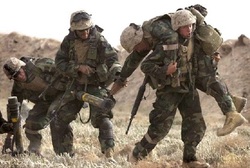
My teacher told us how soldiers are often diagnosed with PTSD or anxiety because they go through traumatic experiences in battle, fighting for their lives and the lives of others. The soldiers are then done their tour of duty one day, and are supposed to just return home and resume normal lives. There is no time for them to process their traumas, no more time to spend with the other soldiers with whom they lived and fought.
Cancer patients are almost exactly like soldiers. In fact, they are soldiers, just on a different battlefield. Cancer patients fight for their life, against their own bodies, and experience life-changing traumas. The battle can rage on for months and years. Then, one day, your treatment is just done. You are supposed to go home and start a normal life again. You have no designated time to process your traumas and you have less and less time to spend with the staff that became your second family during those months and years of treatment. Crazy, right?!
If you are in the thick of treatment or towards the end, you have probably thought about the impending transition you will face when your treatment is over.
In the case of soldiers and cancer patients, I think a key step in the transition is missing. It is something called emotional debriefing or decompression. Emotional debriefing (such a fancy word!) means taking time to process the experiences and develop normal psychological reactions to them. Psychologists can provide this process, but I think for teen cancer survivors, it’s as simple as spending time with others who are also coming out of treatment. Sharing your experiences and talking about them can really help you become more comfortable with what you’ve been through and not develop PTSD or depression.
It is crucial that you understand PTSD and anxiety so that you do not have to live with the impact of those disorders, and get help if you know your symptoms are real. According to Google Health, PTSD is an anxiety disorder that can cause difficulty sleeping, difficulty concentrating, repeated flashbacks of the traumatic event, and feelings of detachment. Symptoms of anxiety include excessive worry, irritability, trouble concentrating, and even nausea. Both of these disorders can be treated and it’s important that, if you feel you are experiencing these symptoms, you talk with your doctor so a diagnosis can be made and a treatment plan can be set up.
As teen cancer patients and survivors, you have not reached the end of your challenges, but there is a hopeful future. With proper follow-up care and a slow, steady return to normal, the relationships with people in your normal life will take over and your memories of hospital days will soon be surpassed by memories of happier times with new friends :)
 RSS Feed
RSS Feed

